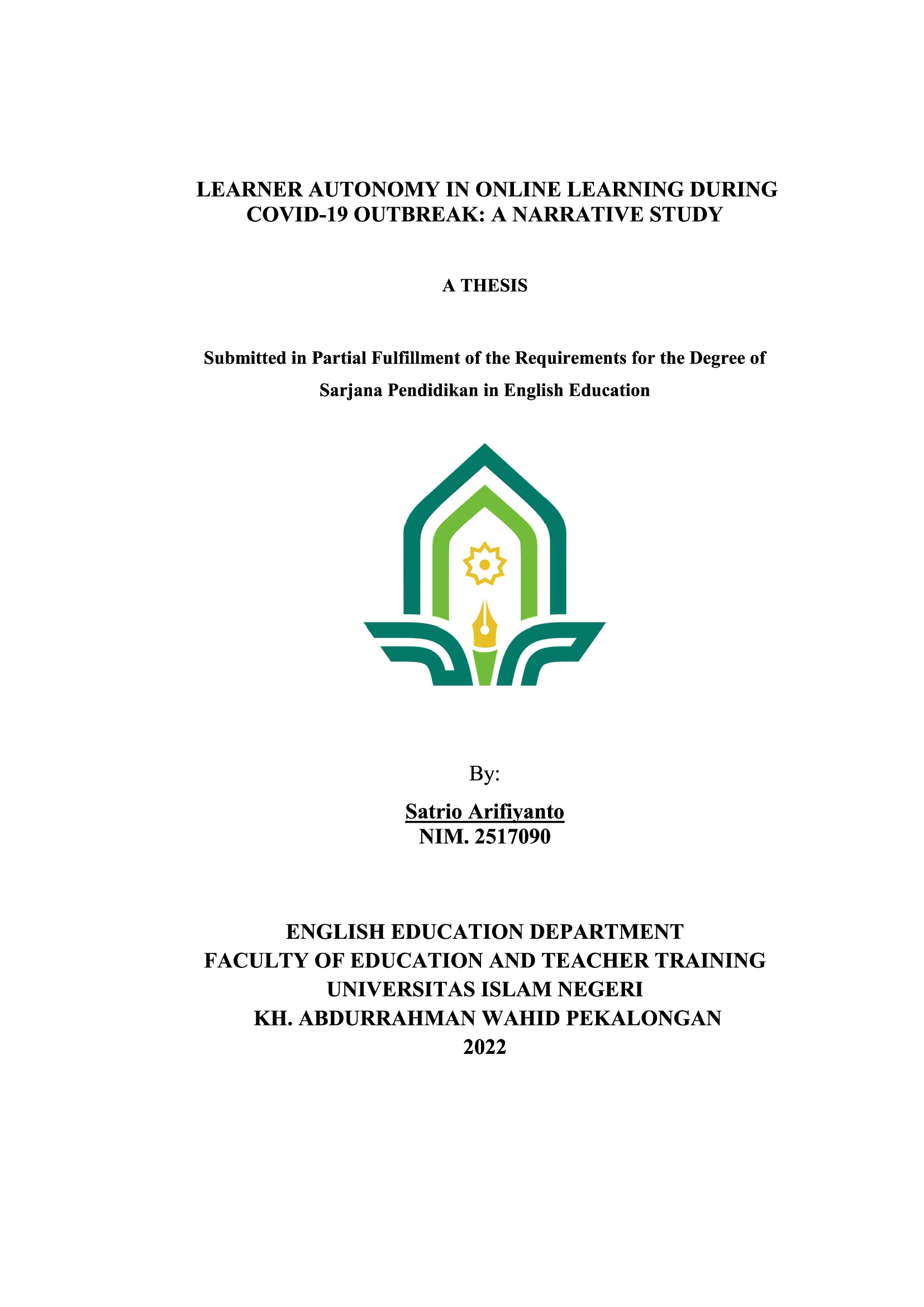
SKRIPSI TADRIS BAHASA INGGRIS
Learner Autonomy in Online Learning During Covid-19 Outbreak : a Narrative Study
Since 2019, human life has been disrupted by the massive spread of the coronavirus. Education is a sector that has been severely affected by this pandemic. Learning mode changes from face-to-face learning to online learning. In online learning, students are required to be more independent in studying the topics. This research conducted to know how learner autonomy is implemented by the students during online learning. This qualitative research followed by 5 English students who joined online learning. The Data collected through semi structure-interview with the participants which was analyzed using thematic analysis from Braun and Clark to find themes and then using learner autonomy theory to find out more about their experiences while implementing learner autonomy. The findings in this study were that participants implemented 3 main phases of learner autonomy, namely initiating processes, monitoring processes, and evaluating processes. The challenges experienced by students in implementing learner autonomy were technical problems that affect self-motivation, and poor time management
Keywords: Coronavirus, Learner Autonomy, Online Learning
REFERENCE
Abernathy, Donna J. (2020). What is E-learning? Defining e-learning is not as easy as it might appear. https://e-student.org/what-is-e-learning/ . Accessed in May,7th 2021.
Abrar, Mukhhash. (2019). Re-telling: A Narrative inquiry of Indonesiam graduate students’ speaking experiences in a United Kingdom university. Indonesian Journal of Applied Linguistics. Vol.8. No.3 January 2019, pp.588-596. doi:10.17509/ijal.v8i3.15257
Akmal, Vika Elvira. (2013. “Perbedaan Proktinasi Akademik Berdasarkan Jenis Kelamin dengan Mengontrol Manajemen Waktu pada Mahasiswa yang Kuliah sambil Bekerja di Yogyakarta”. Empathy Jurnal Fakultas Psikologi 2 (1): 101-105
Aminatun, D., Oktaviani, L. (2019). Memrise: Promoting students’ autonomous learning skills through language learning application. Metathesis: Journal of English Language, Literature, and Teaching. 3(2), 214-220. Doi: 10.31002/metathesis.v3i2.1982.
Anwar, Khoirul. (2012). Not Just GPA, Not Just Graduation: Understanding Dynamics Student Activist Academic Achievement Motivation. Thesis: Gadjah Mada University
Aoki, N. (2001). The institutional and psychological context of learner autonomy. AILA Review, 15, 82-89
Ayesha, Abida (2020) Learner autonomy in a blended learning English language course: a case study of a Pakistani university. PhD thesis, University of Glasgow.
Begum, J. (2018). Learner Autonomy in EFL/ESL Classrooms in Bangladesh: Teachers’ Perceptions and Practices. International Journal of Language Education. 2(2), 96-104.
Braun, V., & Clarke, V. (2006). Using thematic analysis in psychology. Qualitative Research in Psychology, 3(2), 77-101. https://doi.org/10.1191/1478088706qp063oa
Cakici, D. (2017). An investigation of learner autonomy in Turkish EFL context. International Journal of Higher Education 6(2): 89-99.
Chan, H. W. (2016). Popular culture, English out-of-class activities, and learner autonomy among highly proficient secondary students in Hong Kong. Universal Journal of Educational Research4(8): 1918-1923.
Christopher, L. L. (2006). Fostering learner autonomy in a technology-enhanced, inquiry-based foreign language classroom. Foreign Language Annals, 39(1), 71.
Conole, G., Brasher, A., Cross, S., Weller, M., Nixon, S., Clark, P., & Petit, J. (2008). A new methodology for learning design Proceedings of World Conference on Educational Multimedia, Hypermedia and Telecommunications (EDMEDIA), 30 June - 4 July 2008. Vienna.
Ketersediaan
| 23SK2325001.00 | SK TI 23.001 SAT l | My Library (Lantai 3. Local Content) | Tersedia |
Informasi Detail
- Judul Seri
-
-
- No. Panggil
-
SK TI 23.001 SAT l
- Penerbit
- Pekalongan : Jurusan S-1 Tadris Bahasa Inggris FTIK UIN K.H. Abdurrahman Wahid Pekalongan., 2022
- Deskripsi Fisik
-
xiii, 38 hlm., 30 cm; Bibliografi: 39-42
- Bahasa
-
Indonesia
- ISBN/ISSN
-
-
- Klasifikasi
-
371. 35
- Tipe Isi
-
-
- Tipe Media
-
-
- Tipe Pembawa
-
-
- Edisi
-
-
- Subjek
- Info Detail Spesifik
-
-
- Pernyataan Tanggungjawab
-
Satrio Arifiyanto (2517090)
Versi lain/terkait
Tidak tersedia versi lain
Lampiran Berkas
Komentar
Anda harus login sebelum memberikan komentar
 Karya Umum
Karya Umum  Filsafat
Filsafat  Agama
Agama  Ilmu-ilmu Sosial
Ilmu-ilmu Sosial  Bahasa
Bahasa  Ilmu-ilmu Murni
Ilmu-ilmu Murni  Ilmu-ilmu Terapan
Ilmu-ilmu Terapan  Kesenian, Hiburan, dan Olahraga
Kesenian, Hiburan, dan Olahraga  Kesusastraan
Kesusastraan  Geografi dan Sejarah
Geografi dan Sejarah